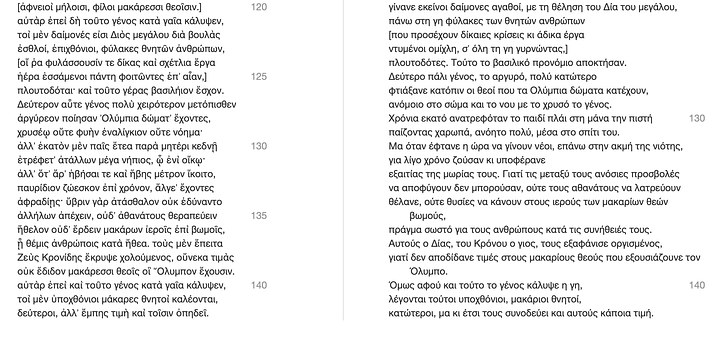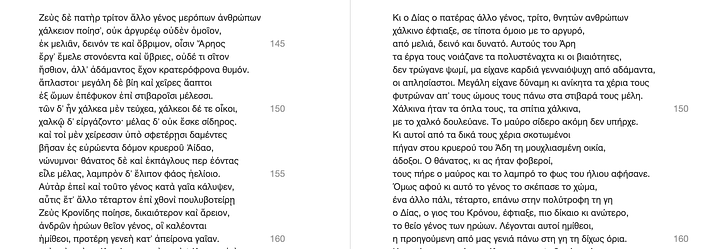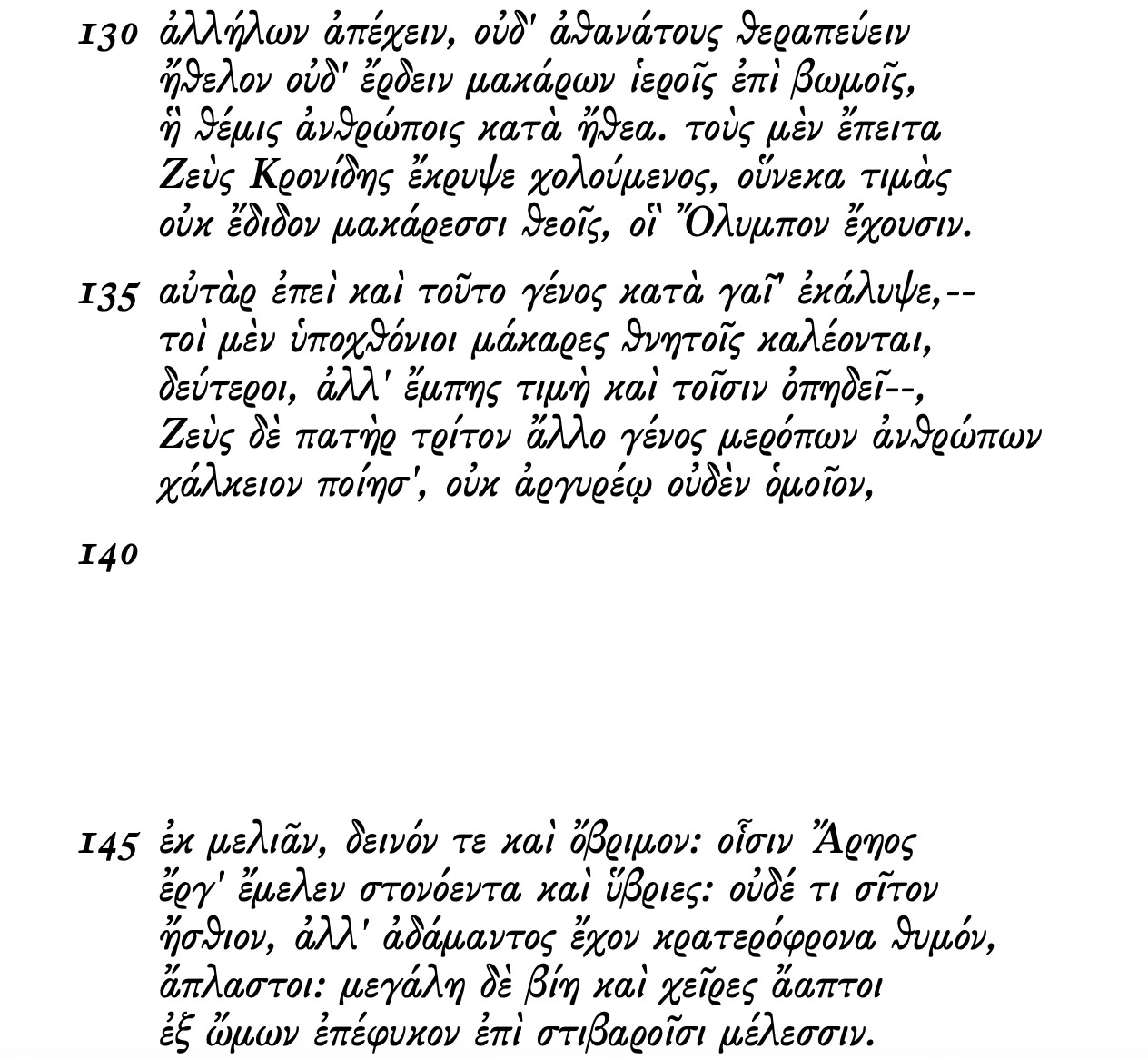The Earth's Captivity and our Extended Lifespan
Hesiod speaks of days where childhood lasted 100 years, but that's not all he claims.
Tonight, we are going to take a dive into “the abyss” of history, as spoken by Hesiod.
The Life Expectancy During the Silver Age
The deep past of humanity, where a child would live for a hundred years prior to adulthood (!), and a curious ‘prediction’ about our future, as we see it unfold before us these days. Scholars attribute Hesiod’s poem titled ‘Work and Days’ to have been written around 800 BC/BCE.
The reality of it is that this is mere speculation.
There are those who believe it was written much earlier but have been unable to pinpoint the exact point in time is unknown. What is also unknown is when exactly Hesiod lived.
As I was reading the poem’s translation by Evelyn White, I noticed the mention of the word ‘jar’. Curious enough, I went to the same verse in the original ancient text to verify. The actual word is not exactly ‘jar’ but ‘pithos’. This is a giant 'container' made of clay and was used in antiquity for the storage of a variety of goods, including grain and wine.
Why is that important?
I trust many, if not all, of us are aware of the drawings and ornaments depicted on those objects. What is much lesser known is that many of those depictions used to have a different function.
Ancient Hellas/Greece was structured as an ‘informal federation’ composed of independent city states. I call it informal because there was no umbrella law to govern them all, other than their common heritage. We see this via the Olympics.
Those city states did not only exist in the mainland of the Balkan Peninsula but had smaller establishments/towns throughout the Mediterranean. Those smaller and isolated towns would often be subject to raids by external enemies. However, there were situations where these raiders, often eager for more plunder, would set their eyes on the mainland.
The local leaders would then attempt to warn the city states of the military movements via merchant ships that were available. However, those ships would often be raided by pirates, the merchandise would be gone, and all the written warnings destroyed. Thus, a new method of warning was invented: the ‘pithoi’.
Those giant… jars (as the English language has no other word for them) became ornamented with drawings that depicted the military movements of the armies that sought to either raid of conquer the city states of the mainland Hellas/Greece.
Due to their weight and size, those objects were widely ignored by the pirates. To offer a reference, the famous philosopher Diogenes used to live inside such a ‘pithos’. These objects had a variety of sizes, and some were actually enormous. This kind of encrypted depiction is believed to have been the early foundation of what was later known as mythology.
Myths are not ‘Fairy Tales’
Since we are here, let us break down the origins of this word.
Mythology is not a ‘fairy tale’, meaning it’s not fictional. Etymologically speaking, it’s a mixed word composed of two others, mitos (μίτος) and logia (λογία) = μιτο-λογία. Many of you are aware of the word ‘Logos’, the basis of ‘logic’. That’s the second part of the ‘mytho-logy’ word.
The first one, mitos is referenced in the adventure of Theseus in the Minoan Labyrinth. It’s the famous ‘Μίτος της Αριάδνης’ or ‘Ariadne’s Mitos’ also known as ‘Ariadne’s Thread’. This was offered by Ariadne, daughter of King Minoas, to Theseus to help find his way out of the Minotaur's maze.
So, we have a word that is used as a ‘thread to navigate out of a maze’ and we have a word that references reason. Bring those two together and we have mitologia/mythology, AKA encoded information.
The cipher for decoding this type of information revolves around reason, given the circumstances and development of the reader’s world and/or surrounding civilization.
With that out of the way, let us return to Hesiod.
The Captivity of the Earth
The ancient philosopher is said to have been also a priest at his time, which makes him even more likely to have used this approach in his writings. Thus, by him saying that the Earth is a ‘pinthos’ that is ‘capped’ at the top with nobody being able to leave it, directs us to believe that humanity was in some form of ‘captivity’. This, I will address on another, even more unconventional post.
Something to keep in mind is that Hesiod speaks of the time where Cronus (Saturn) was reigning supreme, and that there was a ‘Zeus’ under his command (he speaks as everything is ‘under Cronus’).
He also mentions of Cronians as essentially being the actual ‘high caste’.
Wait a minute. Didn’t Rhea take her infant son, Zeus to avoid being eaten by Cronus?
For those of you interested, going through the various elements of Hellenic/Greek mythology, you will find several ‘versions’ of Zeus being someone who emerged from different places. This leads us to believe there was more than just one Zeus.
What was common about them is that they all had exactly the same powers. Could it be that Dias/Zeus was a title and not an actual name?
Speaking of origins, it is also worthwhile to mention that Hesiod speaks that both mortals and gods sprung from the ‘same source’. This means they all came from the same origin, the same place.
In his text, it is implied that this place is outside the… jar, as Zeus is mentioned to be guarding its exit (under Cronus?). This gives us much to think about, yes?
Something else that Hesiod speaks of is that there used to be a time where tranquility was the norm for the Earth, when there was no death from illnesses and no misery ‘cast from above’ as he claims.
He was also one of the first to speak of the Ages of Humanity. The Golden, the Silver, the Bronze and the Iron. He based those on the level of civilization and therefore, consciousness of humanity.
As I was reading the original text that is circulating the Internet as a PDF, I noticed that there are several lines missing. I believe this to be intentional and, yes, suspect.
Thankfully, there is an online library that is not edited and still maintain the missing lines. Here it is:


Part of what those missing lines spoke of is the following:
“ἀλλ᾽ ἑκατὸν μὲν παῖς ἔτεα παρὰ μητέρι κεδνῇ ἐτρέφετ᾽ ἀτάλλων μέγα νήπιος, ᾧ ἐνὶ οἴκῳ·”
Translation:
“A child was brought up at his good mother's side a hundred years, an utter simpleton, playing childishly in his own home.”
So, 100 years of life before reaching adulthood? What would constitute the age of adulthood during that Silver Age? How long was the human life span? I believe these are all legitimate questions, no?
Hesiod also refers to the young adults as ignorant, relatively… stupid, more like per to remembering what it was they lost. We also find him cursing being born in the Iron Age, the worst of them all. He actually dreaded living in the Iron Age himself.
This means that he was born sometime after the 3,615 BC/BCE Cataclysm of Deucalion and Pyrrha, which signaled the beginning of that Age. This is also the Age we live in today per what we lost and who we are as a civilization.
An Ominous Warning
Thus far, after the end of the Golden Age, our Iron Age has been the longest, now entering year number 5,639, with the Bronze Age being second with a 4,640-year duration. There is also something else Hesiod mentioned. He wished to have been born during the Age prior or the Age after our Iron Age, which he implies is going to be much better. So, will our current Iron Age come to an end?
This is where Hesiod makes an attempt at prediction. Along the lines 170 to 201, Hesiod speaks of:
“The father will not agree with his children, nor the children with their father, nor guest with his host, nor comrade with comrade; nor will brother be dear to brother as aforetime. Men will dishonor their parents as they grow quickly old, and will carp at them, chiding them with bitter words, hard-hearted they, not knowing the fear of the gods. They will not repay their aged parents the cost their nurture, for might shall be their right: and one man will sack another's city. There will be no favor for the man who keeps his oath or for the just or for the good; but rather men will praise the evil- doer and his violent dealing. Strength will be right and reverence will cease to be; and the wicked will hurt the worthy man, speaking false words against him, and will swear an oath upon them.”
Does that sound like where we are today? Hesiod precedes these descriptions with:
“And Zeus will destroy this race of mortal men also when they come to have grey hair on the temples at their birth,”
…as he believes that humanity will be in such a state where true justice cannot be delivered.
If we were to decipher the words above, both in his description of today’s humanity and the ‘return of Zeus’, what would be the outcome? I will leave this to your imagination and judgment.






